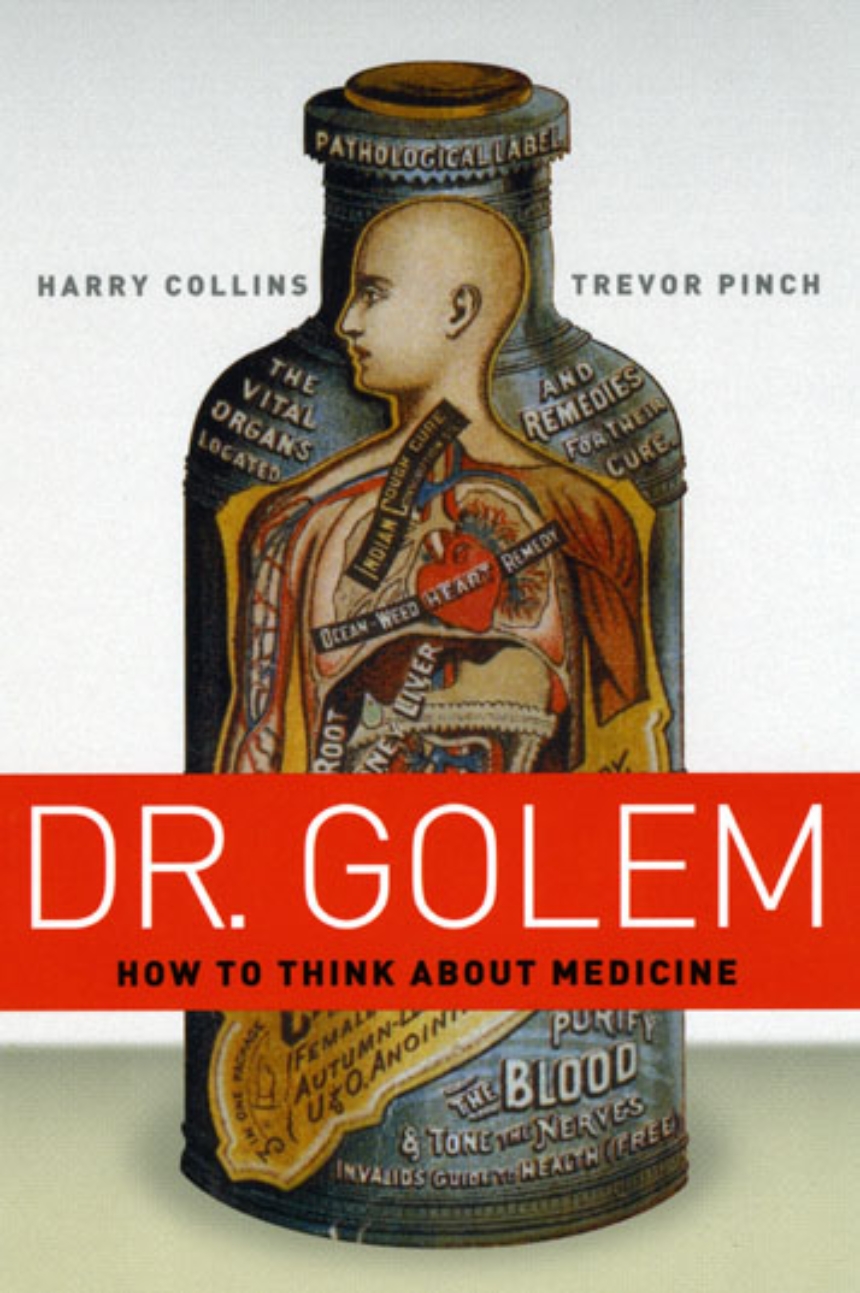Dr. Golem
How to Think about Medicine
A creature of Jewish mythology, a golem is an animated being made by man from clay and water who knows neither his own strength nor the extent of his ignorance. Like science and technology, the subjects of Harry Collins and Trevor Pinch’s previous volumes, medicine is also a golem, and this Dr. Golem should not be blamed for its mistakes—they are, after all, our mistakes. The problem lies in its well-meaning clumsiness.
Dr. Golem explores some of the mysteries and complexities of medicine while untangling the inherent conundrums of scientific research and highlighting its vagaries. Driven by the question of what to do in the face of the fallibility of medicine, Dr. Golem encourages a more inquisitive attitude toward the explanations and accounts offered by medical science. In eight chapters devoted to case studies of modern medicine, Collins and Pinch consider the prevalence of tonsillectomies, the placebo effect and randomized control trials, bogus doctors, CPR, the efficacy of Vitamin C in fighting cancer, chronic fatigue syndrome, AIDS cures, and vaccination. They also examine the tension between the conflicting faces of medicine: medicine as science versus medicine as a source of succor; the interests of an individual versus the interests of a group; and the benefits in the short term versus success rates in the long term. Throughout, Collins and Pinch remind readers that medical science is an economic as well as a social consideration, encapsulated for the authors in the timeless struggle to balance the good health of the many—with vaccinations, for instance—with the good health of a few—those who have adverse reactions to the vaccine.
In an age when the deaths of research subjects, the early termination of clinical trials, and the research guidelines for stem cells are front-page news, Dr. Golem is a timely analysis of the limitations of medicine that never loses sight of its strengths.
Dr. Golem explores some of the mysteries and complexities of medicine while untangling the inherent conundrums of scientific research and highlighting its vagaries. Driven by the question of what to do in the face of the fallibility of medicine, Dr. Golem encourages a more inquisitive attitude toward the explanations and accounts offered by medical science. In eight chapters devoted to case studies of modern medicine, Collins and Pinch consider the prevalence of tonsillectomies, the placebo effect and randomized control trials, bogus doctors, CPR, the efficacy of Vitamin C in fighting cancer, chronic fatigue syndrome, AIDS cures, and vaccination. They also examine the tension between the conflicting faces of medicine: medicine as science versus medicine as a source of succor; the interests of an individual versus the interests of a group; and the benefits in the short term versus success rates in the long term. Throughout, Collins and Pinch remind readers that medical science is an economic as well as a social consideration, encapsulated for the authors in the timeless struggle to balance the good health of the many—with vaccinations, for instance—with the good health of a few—those who have adverse reactions to the vaccine.
In an age when the deaths of research subjects, the early termination of clinical trials, and the research guidelines for stem cells are front-page news, Dr. Golem is a timely analysis of the limitations of medicine that never loses sight of its strengths.
Read an excerpt.
258 pages | 1 halftone, 3 line drawings | 5 x 8 | © 2005
Sociology: Medical Sociology, Theory and Sociology of Knowledge
Reviews
Table of Contents
Preface and Acknowledgments
Introduction - Medicine as Science and Medicine as Succor
1. The Hole in the Heart of Medicine: The Placebo Effect
2. Faking It for Real: Bogus Doctors
3. Tonsils: Diagnosing and Dealing with Uncertainty
4. Alternative Medicine: The Cases of Vitamin C and Cancer
5. Yuppie Flu, Fibromyalgia, and Other Contested Diseases
6. Defying Death: Cardiopulmonary Resuscitation (CPR)
7. The AIDS Activists
8. Vaccination and Parents’ Rights: Mumps, Measles, Rubella (MMR), and Pertussis
Conclusion - The Themes Revisited
Notes
Bibliography
Index
Introduction - Medicine as Science and Medicine as Succor
1. The Hole in the Heart of Medicine: The Placebo Effect
2. Faking It for Real: Bogus Doctors
3. Tonsils: Diagnosing and Dealing with Uncertainty
4. Alternative Medicine: The Cases of Vitamin C and Cancer
5. Yuppie Flu, Fibromyalgia, and Other Contested Diseases
6. Defying Death: Cardiopulmonary Resuscitation (CPR)
7. The AIDS Activists
8. Vaccination and Parents’ Rights: Mumps, Measles, Rubella (MMR), and Pertussis
Conclusion - The Themes Revisited
Notes
Bibliography
Index
